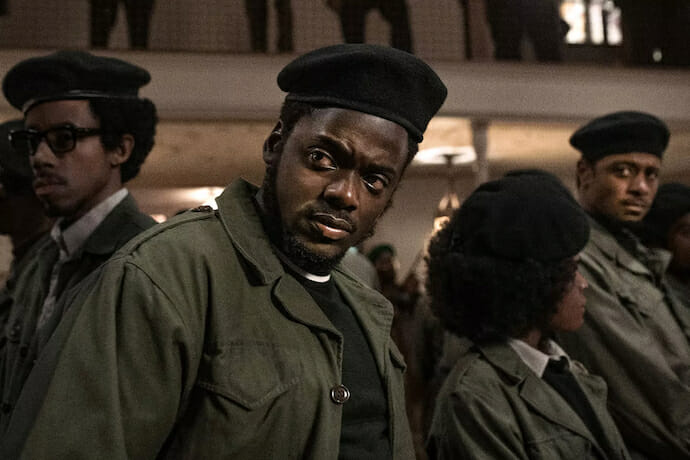‘Judas and the Black Messiah’ Review
Electrifying. Towering. Ferocious. Choose whatever superlative you prefer to describe Daniel Kaluuya’s performance as Fred Hampton, Chairman of the Illinois Black Panther Party. Remarkably, Mr. Kaluuya captures Hampton’s legendary oratory skills, and his stage presence reminds one of Forest Whitaker’s Oscar-winning turn as Idi Amin in The Last King of Scotland (2006). The most stunning part of Judas and the Black Messiah is that this isn’t even really a story about Hampton. Director Shaka King, who co-wrote the script with Will Berson from a story by the Lucas brothers, Kenneth and Keith, actually devotes more time to Bill O’Neal, the FBI informant played by LaKeith Stanfield (Short Term 12, 2013).
The film opens with a montage of activists in the 1960s, including Bobby Seale, and transitions right into a 1968 FBI symposium where FBI Director J. Edgar Hoover (Martin Sheen in botched make-up) tells the auditorium full of agents that the Black Panthers are the greatest security threat to America. From there we watch as Bill O’Neal, wearing a trench coat and fedora, steals a car from a group of men in a pool hall simply by waving an FBI badge. When he’s apprehended, it’s that badge, not the car, that puts young O’Neal (he was 19 at the time) in the precarious situation of going to prison or accepting (actual) FBI Agent Roy Mitchell’s (Jesse Plemons, I’m Thinking of Ending Things, 2020) offer to infiltrate the Black Panthers as a federal informant.
One of the film’s most memorable lines occurs when Agent Mitchell asks O’Neal why he impersonated an agent. The reply: because “a badge is scarier than a gun.” It’s a belief that still holds true more than 50 years later. And that sentiment is a key part of Mr. King’s film. Blatant racism within law enforcement is on display through both the Chicago Police Department’s harassment, and the FBI (and Hoover’s) strategy to prevent the rise of Black Americans.

As fascinating as Hampton and O’Neal are as characters (and real-life men), the script falters in a couple of ways. We never really get to know Hampton except as the fire-and-brimstone speaker on stage. As impressive as that is, it’s a mystery to us how this 21-year old man became so inspirational and skilled at forming alliances. His “rainbow coalition” goal to unite local groups to battle ‘the establishment’ is remarkable, but we are left to wonder if feeding the poor and opening a local medical center were possible through any method other than all-out war. And if so, why the stockpile of guns? Another letdown with the script is that we are not shown how O’Neal manages to become so quickly trusted, and promoted to head of security.
Most of this is told through the eyes of O’Neal, and Stanfield is terrific at capturing the internal conflict and constant danger. Included here are dramatic recreations of O’Neal’s interview on a 1989 PBS documentary entitled “Eyes on the Prize 2,” and he admits to considering Agent Mitchell a role model. Unfortunately, the movie never shows this type of connection between the two men. Rather, it’s an awkward and forced bond between two men, neither of which are comfortable with the actions required of their situation. That’s not to say the two don’t share some tense moments, because they do. Especially effective is when Mitchell explains to O’Neal that the Black Panthers are the same, and equally destructive, as the Ku Klux Klan.
Writer-director King and writers Berson, Lucas, and Lucas are all best known for their TV work, so this is a huge step forward for them. It’s a powerful movie that explains some of the Black Panther ideology and how it was treated by law enforcement. The “War versus Politics” explanation cuts to the bone, as do the actual clips played over the opening and closing credits. Dominique Fishback deserves mention for her terrific supporting turn as Hampton’s girlfriend, especially in her final scene. If you’ve ever wondered about the responsibility of leading a revolution, or the inner turmoil of being a snitch, then you’ll find some answers in this memorable film from Shaka King.
Judas and the Black Messiah is available in theaters and on HBO Max.

